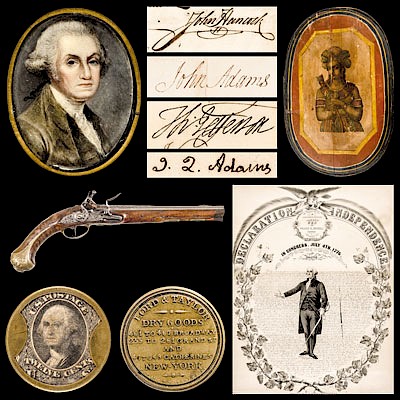c. 1898 Mayor Van Wyck Cabinet Size Photograph
Lot 299
Estimate:
$275 - $350
Absentee vs Live bid
Two ways to bid:
- Leave a max absentee bid and the platform will bid on your behalf up to your maximum bid during the live auction.
- Bid live during the auction and your bids will be submitted real-time to the auctioneer.
Bid Increments
| Price | Bid Increment |
|---|---|
| $0 | $10 |
| $200 | $20 |
| $300 | $25 |
| $500 | $50 |
| $1,000 | $100 |
| $2,000 | $200 |
| $3,000 | $250 |
| $5,000 | $500 |
| $10,000 | $1,000 |
| $20,000 | $2,000 |
| $30,000 | $2,500 |
| $50,000 | $5,000 |
| $100,000 | $10,000 |
| $200,000 | $20,000 |
| $300,000 | $25,000 |
| $500,000 | $50,000 |
About Auction
By Early American History Auctions
Jun 1, 2019
Set Reminder
2019-06-01 12:00:00
2019-06-01 12:00:00
America/New_York
Bidsquare
Bidsquare : Historic Autographs, Colonial Currency, Political Americana & Revolutionary War Era
https://www.bidsquare.com/auctions/early-american-history-auctions/historic-autographs-colonial-currency-political-americana-revolutionary-war-era-4152
Historic Autographs, Coins, Currency, Political, Americana, Historic Weaponry and Guns, John Adams, Thomas Jefferson, Early American History Auctions auctions@earlyamerican.com
Historic Autographs, Coins, Currency, Political, Americana, Historic Weaponry and Guns, John Adams, Thomas Jefferson, Early American History Auctions auctions@earlyamerican.com
- Lot Description
Political
First New York "City" Mayor Robert A Van Wyck Cabinet Card Vindicated of Scandal by Theodore Roosevelt
c. 1898 Mayor Van Wyck Cabinet Size Photograph, credited by "W. Kurtz, New York".
Choice Extremely Fine.
Typical foxing to the Albumen Photograph with a small loss to lower margin edge as shown, overall in superior, grand condition with excellent contrast and eye appeal. Robert Anderson Van Wyck (1849 - 1918), was the First Mayor of New York City after the official consolidation of the Five Boroughs into the City of New York in 1898. (See: more information online.)
(Robert Anderson Van Wyck) (1849 - 1918), was the first mayor of New York City after the consolidation of the five boroughs into the City of New York in 1898.
Brother of Augustus Van Wyck, he was prepared for college at the Wilson Academy in North Carolina, and later graduated from Columbia, where he was valedictorian of his class. He then became an able lawyer and enjoyed a large practice for many years. Later, he was elected Judge of the City Court of New York, becoming thereafter Chief Justice. He resigned to accept the Democratic Party nomination for Mayor of Greater New York, and was elected by a very large majority.
He served as mayor of New York City between 1898 and 1901 and was the first mayor to govern New York City after its five boroughs had been consolidated into a single city. He was a member of the Holland Society, of which he became President. He belonged to many of the social clubs of the city, and was prominent in Masonic circles, being a member of The Ancient Lodge, New York City.
As Mayor, he brought together the innumerable municipal corporations comprising the greater city, adjusting their finances and bringing order out of almost total chaos. He also caused to be constructed the first subway railroad in Manhattan, and provided for the construction of the proposed Brooklyn Tunnel. Van Wyck is generally regarded as a colorless mayor, selected by the sachems (leaders) of Tammany Hall as a man who would do little to interfere with their running of the city.
Initially highly popular as a result of his reversal of the various reforms introduced by the preceding Fusion administration, Van Wyck's mayoralty foundered on the issue of the so-called 'Ice Trust' scandal on 1900. One of the most serious reverses ever suffered by a Tammany mayor, the scandal followed on the revelation, made by the New York World, that the American Ice Company of Charles W. Morse planned to double the price of ice from 30 to 60 cents per hundred pounds. In the era before refrigeration, this was a potentially deadly decision, since ice was the only preservative available to keep food, milk and medicines fresh, and the new price would have put the product out of the reach of many of the city's poor - Tammany's main power base.
The ice trust scandal destroyed Van Wyck's political career and was generally reckoned to have cost Tammany the elections of 1901, which went to the Fusion reformist slate led by Seth Low. However, in an investigation conducted by Governor Theodore Roosevelt, it was determined that Van Wyck had not been personally implicated in the Ice Trust Scandal. In 1906, Van Wyck moved to Paris, France, where he died at the age of 69 on November 14, 1918. The funeral was held at American Holy Trinity Church; he is buried at Woodlawn Cemetery in the Bronx.
- Shipping Info
-
Early American provides in-house worldwide shipping. Please contact us directly if you have questions about your specific shipping requirements.
-
- Buyer's Premium



 EUR
EUR CAD
CAD AUD
AUD GBP
GBP MXN
MXN HKD
HKD CNY
CNY MYR
MYR SEK
SEK SGD
SGD CHF
CHF THB
THB












